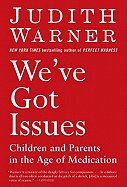
 Still flush with the success of her book Perfect Madness: Motherhood in the Age of Anxiety, New York Times columnist Judith Warner began this follow-up with a healthy measure of righteous indignation at what she perceived as a wholesale movement by parents and physicians alike to pathologize childhood by over-diagnosing mental illness in children and over-treating them with dangerous psychotropic drugs. Before she committed a single word to paper, however, Warner attended a meeting of parents who were worried about their children's behavior and listened to their heartrending stories. "This is not the book I am writing," she scrawled in her notepad. It was the beginning of a paradigm shift in her own consciousness and it led her, after extensive, exhaustive research, to some very different (if no less impassioned) conclusions.
Still flush with the success of her book Perfect Madness: Motherhood in the Age of Anxiety, New York Times columnist Judith Warner began this follow-up with a healthy measure of righteous indignation at what she perceived as a wholesale movement by parents and physicians alike to pathologize childhood by over-diagnosing mental illness in children and over-treating them with dangerous psychotropic drugs. Before she committed a single word to paper, however, Warner attended a meeting of parents who were worried about their children's behavior and listened to their heartrending stories. "This is not the book I am writing," she scrawled in her notepad. It was the beginning of a paradigm shift in her own consciousness and it led her, after extensive, exhaustive research, to some very different (if no less impassioned) conclusions.
To explain both the genesis of her original position and the reason for its reversal, Warner examines the history of psychiatry, the development of new classes of psychiatric drugs and the claims of "epidemic" increases in childhood depression, bipolar disorder and autism. While allowing for a rise in environmental and psychosocial stressors, Warner makes a convincing argument that these serious disorders have always been prevalent but were stigmatized and/or misidentified to the point of invisibility. Advances in neurobiology took the onus of childhood mental illness from parents and placed fallibility with the brain itself, leading to the introduction of a broad new range of antidepressant, antipsychotic and antianxiety medications.
Despite dire news reports claiming vast chunks of the under-18 population was taking such medications unnecessarily and without regard to the consequences, Warner found that the opposite was true. She discovered that in most cases, parents resisted medicating their children until every other option had been exhausted. For many children, this meant going without proper treatment until suffering became acute. Predictably, Warner also found that access to proper care is severely limited for the parents and children who need it the most--those with limited education, funds or support. Nonmedical therapies, so critical to the management and improvement of childhood mental illness, are rarely covered by insurance, leaving diagnoses--and treatment--up to pediatricians.
Though parents of children who have already grappled with the "issues" defined here will not find Warner's findings surprising (their frustration with an inadequate mental health system and desperation over their children's future cannot be overstated), they will find themselves well represented in this deeply felt, eye-opening call for change.--Debra Ginsberg
Shelf Talker: An insightful and enlightening investigation into the question of whether we are overdiagnosing and overmedicating our children from bestselling author and New York Times columnist Judith Warner.

